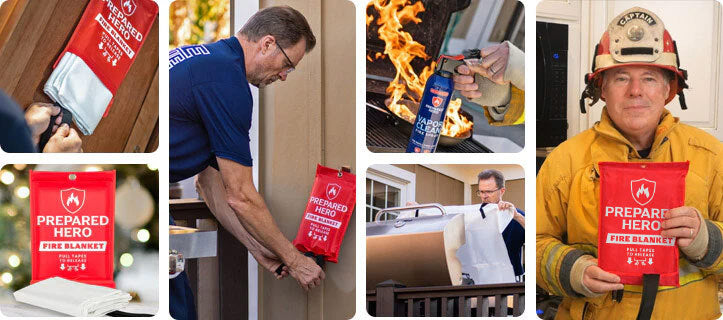Where you put your smoke detectors matters just as much as installing them. Proper placement makes sure they can detect...
Are you planning to build a detached garage? You might have some questions about its safety, cost, and benefits. From costs to fire safety, understanding the ins and outs of detached garages helps you make the right choice. Here's everything you need to know about detached garages, their pros and cons, and tips for keeping your space safe and functional.
What Is a Detached Garage?

A detached garage is separate from the house. Unlike an attached garage, which shares a wall with your home, a detached one stands on its own. Depending on your preference, it can be a few feet away or to the other side of your property.
People choose detached garages for a few reasons. For one, placing a garage behind the house makes better use of space if your lot is long and narrow. It’s also safer since you don’t have to worry about carbon monoxide fumes seeping into your home. Plus, a detached setup is practical if you want to add a workshop or living space above.
Detached garages come in different styles. You can have a custom-built or prefab delivered to your property. Portable garages also exist if you need something flexible.
Advantages of Detached Garages

Whether you want a simple storage space or a full workshop, detached garages are a great option for homeowners who want to get the most out of them. Here are the advantages of detached garages:
1. More Design Options
A detached garage gives you more freedom in terms of design and build. Since it’s not connected to your house, you don’t have to worry about matching it. You can make your detached garage bigger, add extra storage, or turn part of it into a workshop or gym. The possibilities are endless because you can customize it to fit your needs and wants.
2. Better Security
Another perk of a detached garage is security. If someone tries to break into your garage, they won’t have direct access to your house. This means a thief can’t steal your car and break into your home in one go. Plus, detached garages are easier to lock up, making them a less appealing target.
3. Multi-Purpose Use
Need extra space for a hobby, home gym, or guest suite? You can convert a detached garage into whatever you need. You can even split a big detached garage—half for your car and half for your workshop, game room, or gym.
4. Less Noise and Fumes
Detached garages keep all the noise and smells away from your house. You won’t have to hear noises all day if someone works on cars, builds furniture, or uses power tools. Plus, any gas or chemical fumes won’t seep into your home. This makes a detached garage a safer option for storing paint, fuel, and other flammable materials.
5. Improved Fire Safety
A detached garage isn’t directly connected to your house. So, the risk of fire spreading to your home goes down. A detached garage also keeps your home safer if you store flammable items or work with tools that produce sparks.
6. Long-Term Investment
A detached garage can add value to your home. It improves curb appeal and provides extra storage or living space. It’s also easier to expand if you need more room.
Disadvantages of Detached Garages

Detached garages have many pros, but they’re not for everyone. A garage is an investment, so take the time to choose the right one for your needs. Here are the disadvantages of detached garages:
1. Less Convenient
The biggest downside of a detached garage is less convenience. Unlike an attached garage where you can step straight into your home, a detached one means walking to and from your car. This might not seem like a big deal, but it’s not fun carrying groceries through rain or snow.
Having a detached garage also means your tools and equipment are far from your home. If you need to grab something quickly, you’ll have to walk out instead of just heading to an attached garage.
2. Higher Heating and Cooling Costs
A detached garage is a separate structure, so it needs its own heating and cooling if you plan to use it year-round. That means extra insulation, electrical work, and heating or air conditioning—all of which can add up. If you're considering turning it into a guesthouse or bed and breakfast, the cost of keeping it comfortable is something to think about. But this might not be a deal-breaker if temperature control isn’t a big concern.
3. More Expensive to Build
A detached garage is usually more expensive to build than an attached one. It needs a separate foundation, roof, and utilities. You also need to prep the land, which can increase costs even more. Plus, permits and approvals can be an extra headache. While prefab garages can help cut costs, you still need permits and land prep.
4. Exposure to the Elements
If you live in an area with harsh winters or heavy rain, that short walk to your garage can be frustrating. A covered walkway can help, but it’s an extra expense.
5. Potential Restrictions
Some local zoning laws and homeowner associations have restrictions on detached garages. They may have size limits and style requirements. Some prohibit them altogether. This is less of an issue for attached garages, which usually get approved more easily.
Detached Garage Fire Safety Tips

A detached garage keeps your home safer from fires, but you still need to take precautions. Here are the top detached garage fire safety tips to protect your family:
1. Have a Fire Prevention Kit
Every detached garage should have a fire blanket, fire spray, fire protection gloves, and fire extinguisher. A smoke detector can warn you, while a fire sprinkler can douse the fire before it turns into an inferno. You can also place a carbon monoxide detector in your garage if you use gas-powered tools.
2. Store Flammable Materials Safely
Gasoline, paint, propane, butane, and other flammable liquids and gases should be in approved containers. Keep them away from heat sources and off the floor. Find out how to store flammable liquids and gases here.
3. Watch Electrical Wiring
Faulty wiring is a major fire hazard. Call an electrician if your garage has old or damaged wires. Plus, don’t overload outlets, and never use extension cords as permanent solutions.
4. Keep It Clean and Organized
Clutter can fuel a fire and make it spread faster. Keep rags, paper, and other flammable materials to a minimum. Sweep up sawdust and debris regularly. Remember, a small flame can turn into a major fire in 30 seconds without intervention.
5. Be Careful with Heating Equipment
Do you use space heaters or other heating devices? Keep them away from flammable objects. Turn them off when leaving the garage, and never leave them running unattended.
6. Dispose of Oily Rags Properly
Oily rags can spontaneously combust if not stored correctly. Put them in a metal container with a tight lid and dispose of them safely.
7. Install Fire-Resistant Materials
Use fire-resistant drywall, insulation, and doors if possible. A self-closing fire-rated door also helps. Learn how to fireproof your home here.
Are Detached Garages Cheaper to Build?

No, detached garages are more expensive to build. For one, you have to build everything from scratch, including the foundation, walls, and roofing. An attached garage can share part of your house’s foundation and structure, which cuts down on costs. You also need to spend on things like electrical wiring and plumbing. They need to be installed separately, which increases labor and material costs.
Other factors include permits and inspections, which can add to the cost. Plus, you might need to prepare the land—level it, add a driveway, and clear obstacles—all of which cost more money.
Do I Need a Permit for a Detached Garage?

Yes, you need a permit for a detached garage. Local governments require permits for any new structure, and a detached garage is no exception. The rules can vary based on where you live, so check with your city or county’s building department.
A permit helps make sure your structure is safe and up to code. It also ensures your garage won’t cause problems with zoning laws or property lines. You might need additional approvals for electrical work and plumbing if you plan to add those.
Skipping the permit could lead to fines or having to tear down the garage. So, it’s better to get the paperwork sorted before you start building.
Does a Detached Garage Add Value?

Yes, a detached garage can add value to your property. It gives potential buyers more storage space or a place for hobbies. It’s also a big selling point if they need extra room for cars, tools, or a workshop. Plus, it increases curb appeal, especially if it’s well-designed and matches the style of your home. However, the value boost depends on your location. A detached garage is a major plus in some areas. In contrast, it might not make a huge difference in others.
If you plan to sell, remember that a garage can increase the asking price. But it’s important to weigh the cost of building it against the potential return. Overall, a detached garage is often a smart investment to increase your home’s value.
Is a Detached Garage Safe?

Yes, a detached garage is safe. However, it depends on the security and fire safety measures in place.
For example, a detached garage is more vulnerable than an attached garage since it’s separate from your house. A thief could break in without anyone noticing. You can make it safer by putting strong locks, motion lights, and security cameras. Keeping the garage door closed and the area well-lit also helps.
On the other hand, a detached garage is better in terms of fire safety. A fire that started inside is less likely to spread to your house. But fire risks still exist, especially if you store gasoline, diesel, paint, and other flammable materials. Keep them in sealed containers and far from heat sources. You should also have a smoke detector, fire sprinkler, fire blanket, fire spray, and fire extinguisher in your garage.
Overall, a detached garage can be safe with the right precautions. Secure it properly and follow fire safety measures to protect your property.
Conclusion
While it comes with higher costs and extra maintenance, the benefits can make a detached garage a smart investment. Just make sure you follow the proper building codes, permits, and safety precautions to make sure everything goes smoothly.
Do you want reliable, easy-to-use, and affordable tools to put out garage fires before they spread? Check out Prepared Hero’s fire prevention tools here, and get up to 51% off on certain items. Stay prepared, hero!


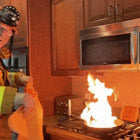 Fire
Fire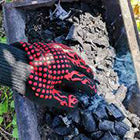 Safety
Safety Survival
Survival Protection
Protection New
New Scouting America
Scouting America
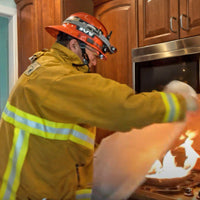 Fire
Fire Safety
Safety Survival
Survival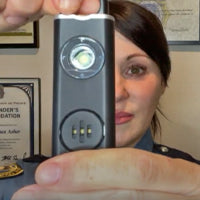 Protection
Protection New
New






